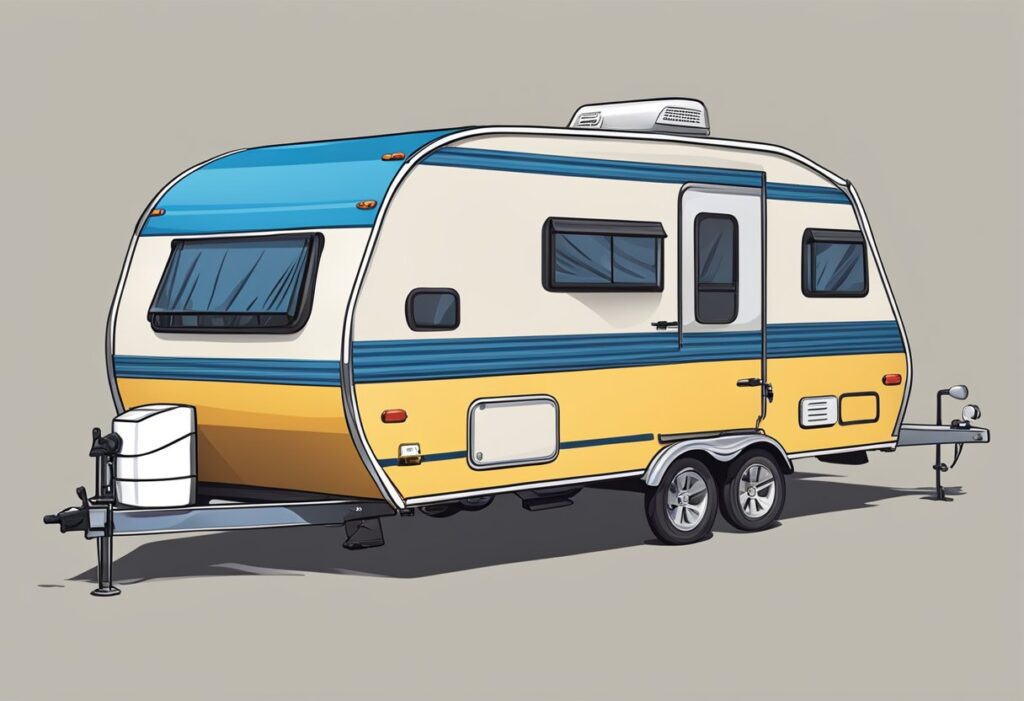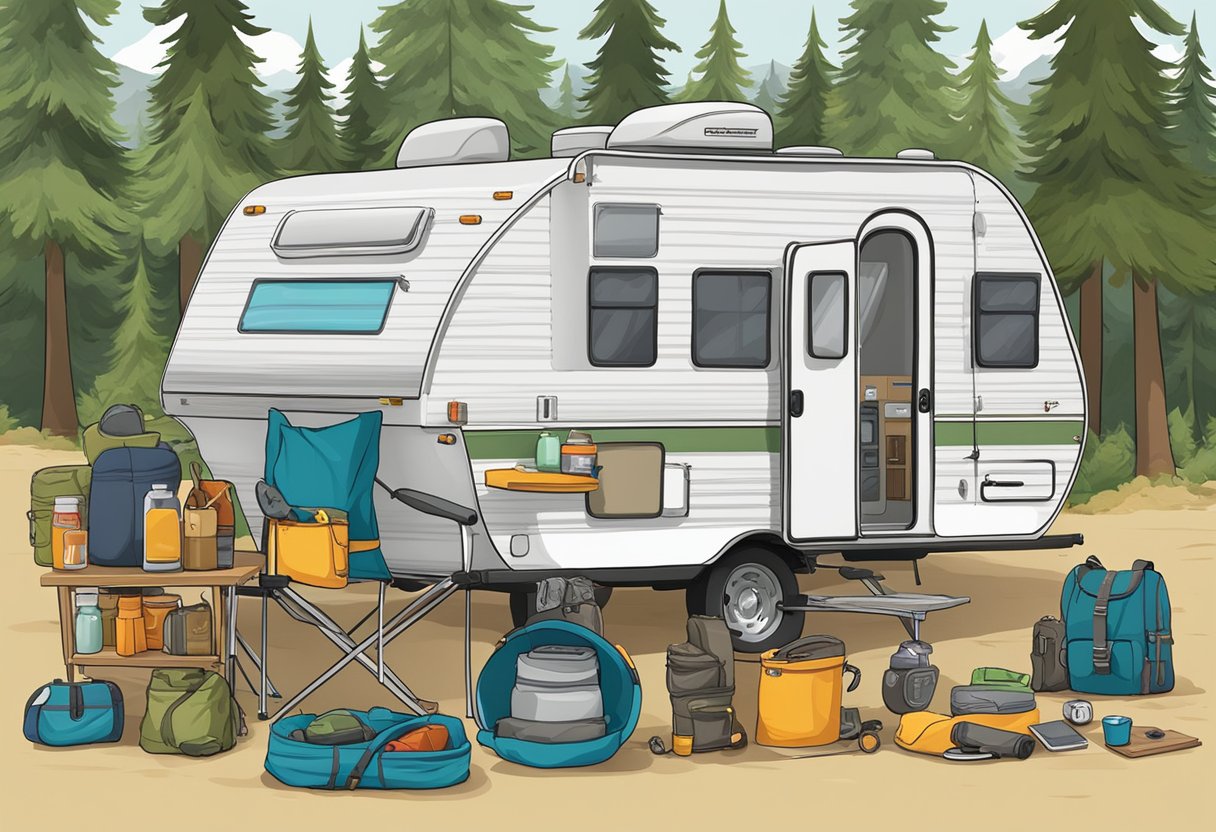Camping trailers are a popular choice for people who love to travel and explore the great outdoors. They provide a convenient and comfortable way to enjoy the beauty of nature without sacrificing the comforts of home. However, one of the most important factors to consider when choosing a camping trailer is its weight. Understanding how much camping trailers weigh is crucial for ensuring safety and avoiding any unpleasant surprises on the road.

The weight of a camping trailer can vary greatly depending on its size, type, and features. Some smaller trailers may weigh as little as 1,500 pounds, while larger models can weigh over 10,000 pounds. Factors that can affect the weight of a camping trailer include the materials used in its construction, the size of its water tanks, and the weight of any additional features such as appliances, furniture, and storage compartments. It is important to note that the weight of a camping trailer does not include the weight of any additional gear or equipment that you may be carrying, such as food, clothing, or camping gear.
Understanding Trailer Weight Terminology
When it comes to camping trailers, understanding weight terminology is essential for safe and efficient towing. Here are some of the most important terms to know:
Gross Vehicle Weight Rating (GVWR)
The Gross Vehicle Weight Rating (GVWR) is the maximum weight that a camping trailer can safely carry, including the weight of the trailer itself, cargo, and passengers. Exceeding the GVWR can cause damage to the trailer or compromise its safety on the road. The GVWR is specified by the manufacturer and can be found on a label on the trailer.
Dry Weight and Cargo Carrying Capacity (CCC)
The dry weight of a camping trailer is the weight of the trailer without any cargo or passengers. The Cargo Carrying Capacity (CCC) is the maximum weight of cargo and passengers that the trailer can safely carry. To determine the CCC, subtract the dry weight from the GVWR. It’s important not to exceed the CCC, as it can affect the trailer’s handling and braking.
Tongue Weight and Hitch Weight
The tongue weight, also known as the hitch weight, is the amount of weight that the trailer’s tongue exerts on the hitch of the towing vehicle. It’s important to have the correct tongue weight to ensure safe and stable towing. The ideal tongue weight is typically around 10-15% of the total trailer weight. Too little tongue weight can cause the trailer to sway, while too much tongue weight can overload the hitch and cause handling problems.
By understanding these trailer weight definitions, campers can make informed decisions about their trailer’s weight and ensure safe and efficient towing.
Factors Influencing Camper Trailer Weight

When it comes to camper trailer weight, there are a number of factors that can influence it. Understanding these factors can help you choose the right camper trailer for your needs and ensure that you are able to tow it safely and efficiently.
Materials Used and Construction
One of the most important factors that can influence the weight of a camper trailer is the materials used in its construction. Camper trailers can be made from a variety of materials, including aluminum, fiberglass, and wood. Each of these materials has its own advantages and disadvantages, and can impact the weight of the trailer. For example, aluminum is lightweight but durable, while fiberglass is strong but can be heavier. Wood is a traditional material that can be used to create a cozy and comfortable interior, but it is also heavy and can require more maintenance.
Amenities and Features
Another factor that can influence the weight of a camper trailer is the amenities and features that are included. Camper trailers can come with a wide range of amenities, from basic sleeping quarters to full kitchens and bathrooms. Each of these amenities can add weight to the trailer, so it is important to consider which amenities are necessary for your needs. For example, a trailer with a full kitchen and bathroom will be heavier than a trailer with just a sleeping area.
Size and Model Variations
The size and model of the camper trailer can also impact its weight. A larger trailer will typically be heavier than a smaller trailer, and different models may have different weight specifications. It is important to carefully consider the size and model of the trailer you choose, as this can impact your ability to tow it safely and efficiently.
Overall, there are a number of factors that can impact the weight of a camper trailer. By understanding these factors and carefully considering your needs, you can choose the right trailer for your next camping adventure.
Calculating Your Trailer’s Total Weight
When it comes to calculating the weight of your camping trailer, there are a few key measurements and calculations you need to make. These will help you determine the total weight of your trailer, including the weight of any gear and supplies you plan to bring along.
Measurements and Calculations
To calculate the weight of your camping trailer, you’ll need to gather a few pieces of information. First, you’ll need to know the dry weight of your trailer. This is the weight of the trailer without any gear, supplies, or passengers on board. You can usually find this information in your trailer’s owner’s manual or by checking the manufacturer’s website.
Next, you’ll need to factor in the weight of any gear and supplies you plan to bring along. This can include everything from camping chairs and cooking equipment to food, water, and clothing. Be sure to weigh each item individually so you can get an accurate estimate of how much weight you’re adding to your trailer.
Once you have the weight of your trailer and gear, you can calculate the total weight by adding them together. Keep in mind that you’ll also need to factor in the weight of any passengers who will be riding in the trailer.
Understanding Weight Distribution
Calculating the weight of your camping trailer is just the first step. You’ll also need to consider weight distribution to ensure your trailer is safe and stable on the road.
One important factor to consider is the dry hitch weight. This is the weight of the trailer that is supported by the trailer ball on your towing vehicle. Ideally, the dry hitch weight should be between 10% and 15% of the total weight of your trailer. You can adjust the weight distribution by moving gear and supplies around inside the trailer.
Another important consideration is the gross combined weight rating (GCWR) of your towing vehicle. This is the maximum weight your vehicle can safely tow, including the weight of your trailer and any gear or passengers on board. Exceeding the GCWR can put you at risk of a serious accident, so it’s important to choose a trailer that is within your vehicle’s towing capacity.
Finally, it’s important to remember that your trailer is only as strong as its weakest link. This means you need to pay attention to the load capacity of your trailer’s tires, axles, and suspension system. Overloading any of these components can lead to a dangerous and potentially deadly situation on the road.
By taking the time to calculate your trailer’s total weight and understand weight distribution, you can ensure a safe and enjoyable camping trip for you and your family.
Towing Capacity and Vehicle Requirements
When it comes to towing a camping trailer, it is essential to have the right tow vehicle and equipment. A mismatched combination can lead to safety hazards, poor performance, and even damage to the vehicle and trailer. Therefore, it is crucial to understand the matching requirements for towing a camping trailer.
Matching Trailer and Towing Vehicle
The first step in matching a trailer and towing vehicle is to determine the towing capacity of the vehicle. The towing capacity is the maximum weight that a vehicle can tow safely. It is essential to choose a trailer that falls within the towing capacity of the vehicle.
Another critical factor in matching a trailer and towing vehicle is the gross vehicle weight rating (GVWR). The GVWR is the maximum weight that a vehicle can carry, including passengers, cargo, and fuel. It is crucial to ensure that the GVWR of the towing vehicle is higher than the GVWR of the trailer.
Vehicle Towing Capacity and Transmission
The transmission of the towing vehicle is also an essential factor to consider when towing a camping trailer. Automatic transmissions are more common in modern vehicles and are generally more comfortable to drive, but manual transmissions can be more efficient and provide more control when towing.
It is also essential to consider the maximum towing capacity of the vehicle’s transmission. The maximum towing capacity is the maximum weight that a transmission can handle without causing damage. Exceeding the maximum towing capacity of a transmission can lead to overheating, premature wear, and even failure.
In conclusion, when towing a camping trailer, it is crucial to have the right tow vehicle and equipment. Matching the trailer and towing vehicle based on towing capacity and GVWR is essential to ensure safety and performance. Additionally, considering the transmission of the towing vehicle is crucial to avoid damage and ensure efficiency.
Types of Trailers and Their Average Weights

When it comes to camping trailers, there are several types available in the market, each with its own unique features and weight. In this section, we will discuss the most common types of camping trailers and their average weights.
Travel Trailers and Teardrop Trailers
Travel trailers and teardrop trailers are popular options for camping enthusiasts. Travel trailers come in various sizes, ranging from small 10-foot models to large 40-foot models. On average, a travel trailer weighs between 2,500 to 7,000 pounds, with a CCC (Cargo Carrying Capacity) of 1,000 to 2,000 pounds. Teardrop trailers, on the other hand, are smaller and lighter, with an average weight of 1,500 to 2,500 pounds. These lightweight trailers are perfect for those who want to travel light and enjoy the outdoors.
Utility Trailers and Small Campers
Utility trailers and small campers are another popular option for camping enthusiasts. Utility trailers are versatile and can be used for a variety of purposes, including camping. These trailers are lightweight and have an average weight of 1,000 to 2,000 pounds. Small campers, on the other hand, are compact and lightweight, with an average weight of 1,500 to 3,000 pounds. These trailers are perfect for those who want to enjoy the outdoors without sacrificing comfort.
Class A and Class C RVs
Class A and Class C RVs are the largest and most luxurious camping trailers available in the market. Class A RVs are the largest, with an average length of 33 feet and an average weight of 20,000 to 30,000 pounds. These RVs are perfect for those who want to travel in luxury and comfort. Class C RVs, on the other hand, are smaller and more compact, with an average length of 28 feet and an average weight of 10,000 to 12,000 pounds. These RVs are perfect for those who want to travel light and enjoy the outdoors.
When it comes to camping trailers, it is important to consider the UVW (Unloaded Vehicle Weight), CCC (Cargo Carrying Capacity), and sleeping capacity. The UVW is the weight of the trailer without any cargo or passengers, while the CCC is the maximum weight that the trailer can carry. The sleeping capacity is the number of people that the trailer can comfortably accommodate.
Manufacturers provide UVW and CCC information for each of their models. It is important to consider these factors when choosing a camping trailer to ensure a safe and enjoyable camping experience.